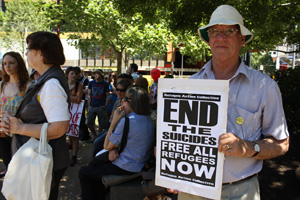
At least 34 of the participants had been on hunger strike for a week.
“The ball is now in the government’s court,” Ian Rintoul, a spokesman for the Refugee Action Coalition (RAC), told IRIN from Sydney. “I hope this will be followed by action and not just words.”
The suspension follows a meeting between an official from Australia’s Department of Immigration and Citizenship and 12 elected hunger strikers from the group on 24 January, with an agreement for both sides to meet again a week later.
More than 3,000 boat people – mostly Sri Lankans, Afghans and Iranians – are now in detention in eight high security immigration detention centres (IDCs) across the country, many for extended periods of time.
According to the government’s own statistics, 38 percent of asylum-seekers had been in detention for over a year.
Policy shift
On 25 November, the government announced a shift in policy that boat arrivals who did not pose risks would be considered for placement in the community on bridging visas, following initial health, security and identity checks.
Priority would be given to those who had spent the greatest amount of time in detention.
Under the plan, asylum-seekers on bridging visas have the right to work and support themselves while their claims for asylum are processed, as well as have access to necessary health services.
“This will be an ongoing, staged process to ensure an orderly transition to the community and that only suitable people are released,” Chris Bowen, Minister for Immigration and Citizenship, said at the time of the announcement, noting he expected at least 100 asylum-seekers to be released per month.
But two months on and only 107 bridging visas issued, detainees and activists have grown frustrated by the slow pace of the process.
More than half the Afghan asylum-seekers, many of them ethnic Hazara, at the Pontville centre, joined the recent hunger strike which ultimately resulted in the hospitalization of at least three.
“There is nothing like 100 visas a month being issued and tensions are growing in all the detention centres,” Rintoul said, describing the government announcement as a “cruel hoax”.
Element of hope
“The process may not be going as fast as we would like, but we acknowledge that it’s a difficult process and one that needs to be done properly,” Alex Pagliaro, a refugee campaign coordinator for Amnesty International, told IRIN, describing the government’s plans to release more asylum-seekers into the community as “genuine”.
“They need to ensure that all necessary services are available to them when they are released,” she said, adding: “Once the process speeds up, this will take the pressure off the detention centres, which are already overcrowded.”
“Issuing bridging visas for asylum-seekers who arrive by boat is an important first step towards ending the suffering of thousands of vulnerable people experiencing extended and needless detention,” Paul Power, chief executive officer of the Refugee Council of Australia, added.
“We encourage the Federal Government to continue releasing more people into the community while their claims for asylum are being assessed,” he said, citing the importance of having a single system of processing, regardless of whether asylum-seekers arrive by boat or by plane.
According to the Department of Immigration and Citizenship, there are more than 5,000 asylum-seekers in Australia today, including 3,464 in the IDC system on the mainland, 945 in immigration detention on Christmas Island off the southern coast of Indonesia, as well as 1,324 living in community detention.
Under Australian immigration law enacted in 1992, any asylum-seeker arriving in the country without a visa by boat can be detained indefinitely, while those arriving by plane with a visa can be processed in the community.
IRIN News
ds/mw
Theme (s): Human Rights, Migration, Refugees/IDPs,
[This report does not necessarily reflect the views of the United Nations]
